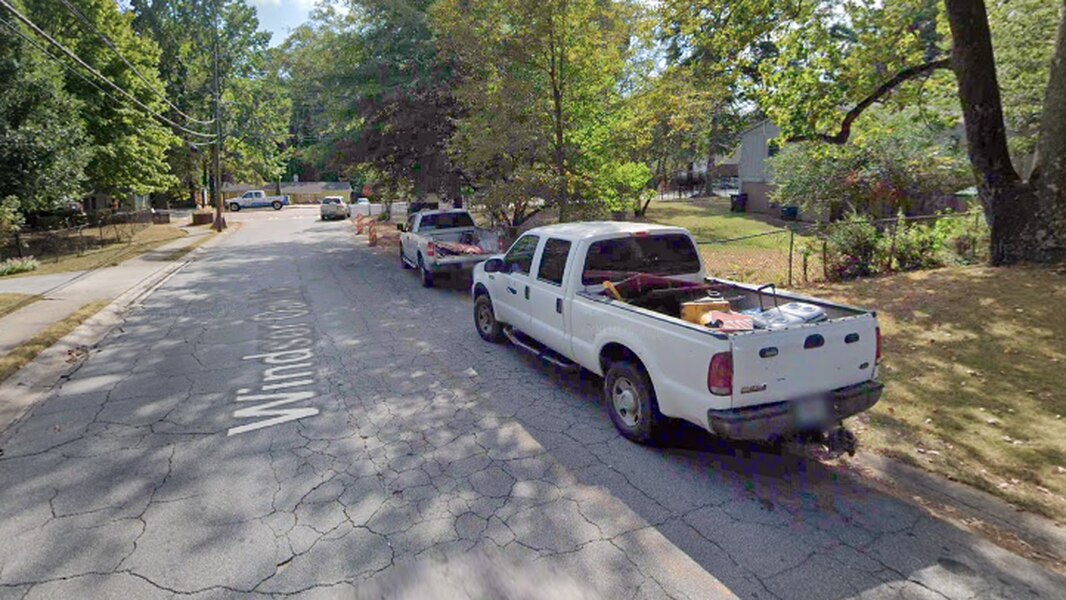
This is a Google Maps image of Windsor Oak Drive, which shows multiple pickup trucks parked along a residential street. Credit: Google Maps
By Zachary Hansen
Doraville city leaders passed a new parking ordinance that some say unfairly penalizes blue-collar workers who park heavy work vehicles in their neighborhoods.
On-street parking in residential neighborhoods has been a hot button issue in Doraville for the past decade. Residents clamored for years that large vehicles, often commercial work vans and trucks, crowded their streets and were dangerous for pedestrians, bikers and other drivers to maneuver around.
City leaders finally took action last week. Vehicles that surpass a certain weight limit will no longer be legal to park along residential streets, meaning most pickup trucks, full-sized SUVs and large minivans must be parked in a driveway.
“I drive a little Honda Civic, and when these trucks are parked all around my driveway, I can’t see to even get out of my own driveway,” Councilwoman Stephe Koontz told The Atlanta Journal-Constitution. “I’ve almost been hit multiple times.”
The restrictive update to the city’s code has drawn criticism from blue-collar workers and the Latino community, who claim the change will disproportionately affect them. More than half of Doraville’s residents are Hispanic, and construction jobs are among their most common occupations, according to the Latin American Chamber of Commerce.
Councilwoman Rebekah Cohen Morris was the only city leader to vote against the measure, which passed Jan. 20.
“It’s discriminatory to people who have lifestyles that are different than those people who might choose to drive smaller cars,” Morris said. “And based on some comments that I have seen from certain people, I do know there is, at the very least, a bit of a classist tone to this.”
Councilmembers adjusted existing parking laws to limit any vehicle that has a “gross vehicle weight rating” of 6,000 pounds or more, whether or not it is labeled a commercial vehicle. The previous limit was 8,000 pounds, which was already less than DeKalb County’s 10,000-pound definition for commercial vehicles. A vehicle’s weight rating is determined by the manufacturer and is the vehicle’s maximum safe weight when fully loaded.
Koontz said that there are times garbage trucks, firetrucks and ambulances can’t get down certain streets because of large vehicles parked on streets.
“I don’t feel like we should wait for someone to die because an ambulance can’t get to them when we know this is an issue,” Koontz said.
There are exceptions to the city’s new law. Heavy vehicles can be parked along the street if it’s needed for active work. The new law primarily targets overnight parking and those who leave these large vehicles unattended for hours at a time.
Koontz said stricter on-street parking laws are not unprecedented, citing Chicago as an example. Doraville’s law does not apply to residential areas that consist of multi-family apartments, condominiums, and townhomes.
Linda Rawlins, a Doraville resident, spoke in favor of the new law during a city meeting in December. Several people spoke at that meeting, both for and against the measure.
“I don’t think that longtime homeowners should cater to certain groups,” Rawlins said. “We’re not trying to get rid of anybody. We have to have (residential) neighborhoods and not commercial neighborhoods.”
The city also discussed increasing its driveway parking limit, which is also currently 8,000 pounds. However, Koontz said that effort was tabled amid public controversy over the changes. As a result, there’s no legal place in a residential neighborhood to park a vehicle any heavier.
There will be a six-month probationary period before Doraville police officers begin writing tickets. The city will issue written warnings — both in English and Spanish — during that time.
After six months, warnings will be issued on first offense, but subsequent violations will result in a citation. The city has not determined the fine’s amount, leaving that decision to municipal court judges.
Koontz said a sign will be placed at the end of each street to warn drivers about parking limits. Morris worried the new law could still be a surprise to visitors.
“If I go out to my car and see a ticket on it, and there’s no sign telling me not to do it (park there), I would be really frustrated,” Morris said. “And if that’s one of my only interactions with the city, it sends an unwelcoming message to residents, to guests and to visitors.”
Morris worries this law could bring further lawsuits against Doraville, which has faced legal battles over its large number of code enforcement citations. Koontz said the city is not trying to make money off of more parking tickets.
“We’re trying to get people to park these big trucks in their driveway,” she said. “I realize it might be inconvenient for people to shuffle their cars around and not just park one of them out on the street, but I don’t think their inconvenience is worth risking someone else’s life.”
Read the original story on AJC.com.











